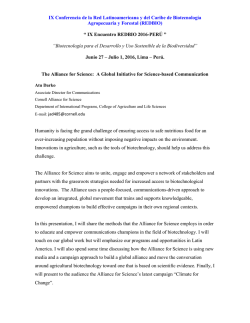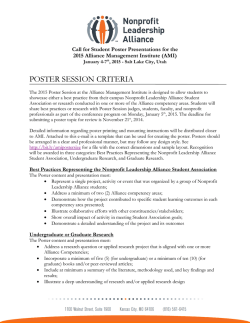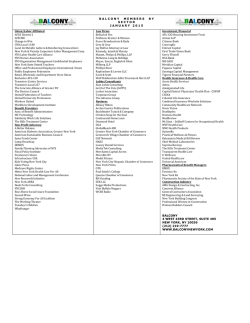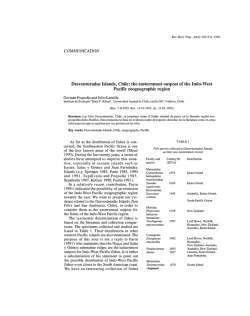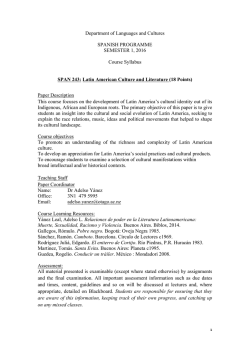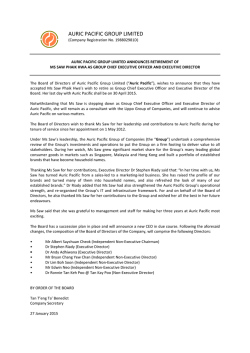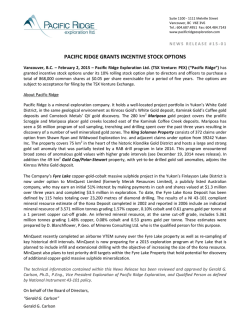
The Pacific Alliance: Creating opportunities for investors
The Pacific Alliance: Creating opportunities for investors A TMF Group briefing Antonio Soler Regional Director Business Development - Americas In this paper Pacific Alliance synopsis 3 The Alliance members 4 Potential joiners, more opportunities 5 Candidates 6 Promising future6 My view: Walter Gutsch7 My view: Fernando Garrido 8 My view: Daniela Diaz Quijano 9 My view: Cristian de la Cerda 10 Taking advantage of the rising opportunities 11 In order to achieve greater competitiveness and economic strength, Latin American countries are combining forces and cooperating through different projects. Here we discuss one of the recent and most promising ones: The Pacific Alliance. With a mixture of emerging economies, political uncertainty and tremendous contrasts in business styles, the 22 nations of Latin America can never be categorized as one homogenous whole. The global economy is currently going through a period of stagnation where every country is facing an environment of slow progress, little development and poor competitiveness. However, Latin America appears to be one of the few regions that will flourish in the next few years. While Latin American countries have different social and political environments, there are common challenges and opportunities - including that most of them offer an exceptional workforce and a land of opportunity for businesses. The region has its complexities, mainly due to the lack of a consistent regulatory framework, but with improvement in areas like transport infrastructure, telecommunications and electricity this large emerging market can prove to be very fruitful for foreign investors. The creation of new political and economic collaboration blocs is not something new for Latin America - a number of groups have been established even though not all of them have so far succeeded in fostering a significant and sustainable expansion of economic ties among members – but the latest bloc is creating a buzz in the investment world. The Pacific Alliance, created in 2011 constitutes the world’s 8th largest economy and the 7th largest exporting entity globally – with a growing relationship with Asia Pacific. Indeed at the beginning of July, the Presidents of the Member countries Chile, Colombia, Mexico and Peru - with delegates from 42 observer countries - came together at the X Summit of the Pacific Alliance to discuss the opportunities and challenges of boosting the economic and social competitiveness of their respective countries. They were joined by representatives from multiple international organizations that support the region’s economic and social integration. Despite the current global market sluggishness, the World Bank reports that the four countries have a combined GDP of $2.1 trillion, which is a large percentage of the combined GDP of Latin and Caribbean countries ($4.765 trillion in 2014). Also, between 2011 and 2014, exports from the Pacific Alliance increased by an average of 4.2%. In general, the region has been able to deliver growth, sound policies and significant advances in reducing poverty and inequality. The Pacific Alliance can add vitality, boost the economy and enhance the region’s connections with the rest of the world. It offers great opportunities for would-be investors – particularly in the areas of natural resources, energy and manufacturing. Significant improvements in the transport and service infrastructure have greatly enhanced the transit of goods and the ease of establishment of local operations leaving plenty of room for companies to grow. Pacific Alliance synopsis High expectations set The principal objective of the Pacific Alliance is “to build, in a participatory and consensual manner, an area of deep economic integration that promotes a larger growth, development and competitiveness of the Parties’ economies through the free circulation of goods, services, capital and persons”. Other objectives include: to achieve greater welfare, overcoming socio-economic inequality and achieving greater social inclusion of inhabitants to become a platform for political articulation, and economic and trade integration, and project these strengths to the rest of the world, with a special emphasis on the Asia Pacific region to achieve greater market diversification to reduce the vulnerability of member countries against the crisis. Likewise, the four countries stand out regionally by their macroeconomic stability reflected, among other variables, on average unemployment and inflation rates. The latest International Monetary Fund projections for the countries’ real GDP growth (annual percentage change) are tabled below: IMF Projections 2015-2016 Country 2015 2016 Chile 0.9% 0.6% Colombia -1.2% 0.3% Peru 1.4% 1.2% Mexico 0.9% 0.3% Talking numbers: a high-value partnership As a whole, the Pacific Alliance group constitutes the world’s eighth-largest economy and represents the seventh-largest exporting entity globally. This clearly provides competitive advantages for international businesses operating or looking to do business in the participant countries. In Latin America and the Caribbean, the group represents 38% of GDP, concentrates 50% of total trade and attracts 47% of direct foreign investment that flows to the region. Also, the four countries total a population of 218 million people. This population is mostly young, and provides a skilled labor force, in addition to an attractive market with purchasing power in constant growth. The Pacific Alliance countries also offer competitive advantages in sectors such as mining, forestry, energy, agriculture, automotive, fishing and manufacturing. Combining forces for greater expansion potential Alliance members generated a gross domestic product (GDP) of USD 2,123,883 million in 2013, which is about 35% of the Latin America and the Caribbean total, and registered a growth rate of 3.6%. This demonstrates its great potential and ability for expansion. An extended agreement with US, the EU and Asia According to the Ministry of Commerce, Industry and Tourism of Colombia, China and the rest of Asia are important recipients of the products sold abroad by the four countries, especially Chile, Colombia and Peru. In 2013, the region received 46.2%, 15.6% and 29.7% of the country’s exports, respectively. However, the United States (US) is the main partner of Colombia and Mexico with 31% and 79% of total exports correspondingly flowing north. The European Union (EU) is an equally important partner for the four countries, receiving 16.4% of Peru’s exports, 14.6% of all exports from Chile, 15.7% in Colombia and 5.2 % from Mexico. About the Alliance members Source: Pacific Alliance Chile Peru With a population of 17.62 million people, Chile is an emerging and stable economy with low inflation ranging between 1% or 3% annually. The country has been ranked as the best economy in Latin America and one of the most recognized worldwide by establishing itself as one of the most competitive economies in the region. Chile maintains bilateral treaties to avoid double taxation with more than 20 countries, and its tax system is transparent, competitive and widely computerized. Although the International Monetary Fund (IMF) reported that uncertainty over the impact of policy reforms appears to be weighing on investment in Chile, there are signs that growth has started to recover. Peru is one of the region’s fastest-growing economies and already has more than 15 trade agreements in place. Between 2002 and 2013, the average growth rate was 6.1% in a context of low inflation (2.6% on average). Growth slowed in 2014 as a result of adverse external conditions, a corresponding decline in domestic confidence and fewer investments - however, at 2.4%, the 2014 GDP growth rate remained above the regional average and inflation was only slightly above the target rate for the year. Peru has a population of 30.7 million people and its most prominent industries are mining of metals, petroleum, fishing, textiles, clothing and food processing. Colombia Mexico Colombia is home to a booming economy with a keen focus on international markets and foreign trade, but navigating its complex tax, legal and regulatory challenges can be difficult without the help of local personnel. Open, transparent and ready to trade are the three cornerstones of the Colombian economy. Thanks to a strong international integration with 15 trade agreements, there is a preferential access to a market of more than 1.5 billion customers for companies investing in the Latin American powerhouse. Colombia has a population of 48.32 million. Mexico offers investors and businesses a land of opportunity - but doing business can be a time-absorbing task, which is why having local knowledge as part of the venture is crucial. The country is home for more than 122 million people; it has made improvements to its infrastructure and fostered competition in sectors such as transportation, energy and telecommunications. As a result, it now occupies the 13th place among world economies and is 11th based on purchasing power. Mexico is expected to be the 7th biggest economy worldwide by 2050. Potential joiners means more opportunities Source: Pacific Alliance Non-members of the Alliance may participate in the events and meetings as observers in accordance with the requirements established by the Council of Ministers of the Alliance. If an Observer Country has free trade agreements with at least half of the participant countries, it can request to be a candidate to join the Pacific Alliance. Actual observer countries by region EMEA United Kingdom Belgium France Portugal Spain Morocco Italy Netherlands Germany Switzerland Finland Turkey Israel Georgia Greece Denmark Poland Sweden Hungary Austria APAC India China New Zealand Australia Japan Singapore Korea Thailand Indonesia Americas Canada United States Guatemala El Salvador Ecuador Dominican Republic Trinidad & Tobago Paraguay Uruguay Honduras Haiti Costa Rica Panama Possible future alliance members Costa Rica Costa Rica is one of the most attractive countries to do business in Central America, offering one of the strongest social and political environments in the region for multinational companies and an exceptional workforce. Costa Rica’s stable mercantile and banking regulations, combined with high standard modern services, create a secure scenery for investors and corporations. Panama During the last decade Panama has emerged as one of the leading countries to do business in Central America. It has built a robust economy and stable government to become the largest Free Trade Zone of the western hemisphere due to the Panama Canal, excellent geographic position and modern banking facilities which have led more than 80 national and international banks to establish operations in the country. What has the Pacific Alliance accomplished to date? According to the Ministry of Commerce, Industry and Tourism of Colombia, the Pacific Alliance has already made progress in the following: cooperation on climate change and sustainable energy consumption elimination of tourist and business visas for citizens joint promotion of exports, investment and tourism in the participant countries opening of embassies and offices of joint promotion to expand the geographic coverage and reduce the costs the countries would incur in by acting individually regulatory reforms and harmonization of rules deepening of free trade creation of an infrastructure fund to improve the competitiveness of countries progress in fiscal transparency to facilitate the fight against transnational crime Other achievements according to the Inter-American Development Bank are: creation of scholarships to university students so they can study in other member countries inter-institutional cooperation agreement between sanitary agencies exchange of best practices in areas of interest such as the development of small- and medium-sized enterprises Promising future The Pacific Alliance is an open and inclusive integration process, comprised by countries with similar visions of economy growth, development and of the free trade. This will offer competitive advantages for both international and local businesses when new trade and investments opportunities arise, considering also that the four countries participating have great experience in achieving significant agreements. Some of the opportunities for the participant countries and investors are: Competitive advantages in industries like mining, forest resources, energy, agriculture, automotive, fishing and manufacturing, among others. Ability to promote commercial, investment, innovation and technological exchange with the most competitive regions around the world. Greater expansion opportunities if EMEA and/or APAC Observer Countries join the Alliance. Suitable platform to encourage joint ventures, foreign investments and entrepreneurship. Greater collaboration and partnership among the participant countries. The Integrated Latin American Stock Market (MILA) was created to offer a greater supply of stocks, issuers, and funding to investors throughout Latin America. Collaboration between the Pacific Alliance and the Southern Common Market (Mercosur) is possible. Together the groups represent more than 80% of the regional foreign trade and over 90% of its GDP, according to a United Nation’s report. Greater negotiating power than any of the individual countries could have separately when approaching Asia. Easier trade agreements with the US easier, providing better opportunities for both the US and the Latin American countries. My view: Walter Gutsch I find it very interesting that the Alliance will remove trade barriers, boost capital and people entailment treaties, and eliminate tariffs. There will be many opportunities related to tourism, culture and personal aspects.” The Pacific Alliance’s activities will offer a large shared benefit for all the countries involved: that is, visibility to the world. The group will be the eighth-largest global export powerhouse, increasing the chances of global recognition. A smart step for companies interested in taking advantage of this benefit will be to count on an expert with both local understanding and global presence. A great competitive advantage of the Alliance is that it is an international open bloc; it will promote trade both regionally and globally. The Alliance has a good trade balance and having less reliance on specific partners will prevent many mishaps. This is a great opportunity for both TMF Group and our clients. TMF Group has the ability to centralize the services in the participant countries - and as we also have global reach, we can offer more and better opportunities to our clients.’’ Walter Gutsch Managing Director TMF Group Peru [email protected] My view: Fernando Garrido The Pacific Alliance will be beneficial for Mexico in many areas, but especially in everything related to trade. The country has free trade agreements with 44 countries now and there is a high possibility that this number will increase. Trade liberalization with the participating countries will give balance to Mexico, causing bigger business expansion and a higher surplus. I am struck with the Alliance’s approach to conquer the Asia Pacific market. Businesses operating in the participating countries should count on an expert with knowledge in both the Asia Pacific and Latin American markets, that can help take advantage of the increased opportunities in imports and exports. Fernando Garrido Managing Director TMF Group Mexico [email protected] We will also see that the strategic geographic location of these countries will generate progress in terms of resources, mobility and team collaboration, processes and technology. This will create a safer and more stable social and business environment. TMF Group is present in more than 80 jurisdictions, including the four countries participating in the Alliance. This presence offers customers better regional and global dynamics and greater investment opportunities. TMF Group can develop and implement centralized strategies to strengthen our clients’ business.’’ My view: Daniela Diaz Quijano The strategy that the countries participating in the Alliance have been using to promote free trade will make them be more competitive in the regional and global levels, which is why is important for business to start looking for centralized support. This Alliance will generate significant growth for business as new export opportunities arise. It will also impact progress in areas such as the economy, technology and training. We will see many businesses growing and many others being born in the area, but it is highly recommended that they understand the complexities of each jurisdiction first. It will be interesting to see how the volume of transactions among countries of the Alliance and Asia Pacific ones increases. Likewise, the treaties that Colombia has with the United States and the others have with various countries will be of benefit for all when making efforts as a group. TMF Group is a leader both locally and globally. By having a presence in all the countries participating in the Alliance, in Asia Pacific and in other parts of the world, we can offer a unique advantage to our customers: they can have a single point of contact in all of the countries instead of multiple independent suppliers.’’ Daniela Diaz Quijano Managing Director TMF Group Colombia [email protected] My view: Cristian de la Cerda The Pacific Alliance will bring potential business opportunities for and with different blocs from around the world, including with big players like Korea and the United States. Companies wanting to grow should definitely start evaluating the participant countries and if these markets are good prospects for their businesses or not. This group is working on regulatory reforms and the harmonization of rules; this will make things easier for businesses operating in two or more of the countries. And this is actually something we can help with; having offices in the four jurisdictions we can act as a single point of contact and manage the requirements individually or as a whole. Cristian de la Cerda Managing Director TMF Group Chile [email protected] There are other projects that the participant countries are working on that will also have a positive impact in the business atmosphere. For example, the group’s objectives include technological improvements, cultural cooperation and environment protection, areas that influence how you do business. Chile is an emerging economy with lots of potential, which combined with the experience the country has maintaining bilateral treaties with more than 20 countries, makes Chile and the Alliance bloc even more attractive to investors.’’ Taking advantage of the rising opportunities The Pacific Alliance and other partnerships and trade agreements happening across the world will benefit Latin America and those operating in the region. Using a single strategic supplier locally wherever you are interested in doing business could help provide consistency across processes and standards, decreased cost and increased efficiencies for your business. By taking away the burden of the back office and working as one global provider, TMF Group works with you to increase efficiency and help strip out any unnecessary costs. We can: Get you legally set up and structured Help to ensure you stay compliant, manage your risk and stay on the right side of regulators and filing requirements by managing your international entities and corporate secretarial Help you find a base - whether you need a registered address, a rented office or help managing your own premises Can help you to hire the right people, to ensure your international policies are fully implemented in employment contracts and handbooks, and to ensure that your staff on the ground are paid in compliance with local law Take care of local statutory bookkeeping, full consolidated accounts and reporting, and management reporting to relevant local and international standards In the Americas, we have one of the strongest multicountry offerings to help clients to navigate local complexities, mitigate risks and control costs. And with offices also throughout, Europe, Middle East, Africa and Asia, we help companies of all sizes and from all sectors to grow their businesses and streamline their operations in the region – and throughout the world. TMF Group is the global expert that understands local needs. Additional reporting: Linda Negron Want to talk about what you’ve read here? Contact your local TMF Group office; details found at tmf-group.com E: [email protected] Whilst we have taken reasonable steps to provide accurate and up to date information in this publication, we do not give any warranties or representations, whether express or implied, in this respect. The information is subject to change without notice. The information contained in this publication is subject to changes in (tax) laws in different jurisdictions worldwide. None of the information contained in this publication constitutes an offer or solicitation for business, a recommendation with respect to our services, a recommendation to engage in any transaction or to engage us as a legal, tax, financial, investment or accounting advisor. No action should be taken on the basis of this information without first seeking independent professional advice. We shall not be liable for any loss or damage whatsoever arising as a result of your use of or reliance on the information contained herein. This is a publication of TMF Group B.V., P.O. Box 23393, 1100 DW Amsterdam, the Netherlands ([email protected]). TMF Group B.V. is part of TMF Group, consisting of a number of companies worldwide. Any group company is not a registered agent of another group company. A full list of the names, addresses and details of the regulatory status of the companies are available on our website: www.tmf-group.com. © July 2015 TMF Group B.V. tmf-group.com
© Copyright 2026
